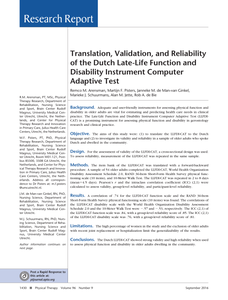De algemene gezondheidstoestand van de bevolking wordt veelal gemeten met de RAND-36 item Health Survey. De afkorting RAND verwijst naar de Amerikaanse onderzoeksorganisatie voor ‘Research and Development’ die de vragenlijst ontwikkelde. In 2012 is door Fontys en partners een longitudinaal veldonderzoek gestart met als doelstelling het in kaart brengen van factoren die van invloed zijn op het gebruik van technologie ter bevordering van het zelfstandig wonen door ouderen. In totaal worden 50 deelnemers van 70 jaar of ouder, vier jaar lang elke acht maanden geïnterviewd. Tevens worden er enkele vragenlijsten afgenomen waaronder twee vragen uit de RAND-36 waarvan een item luidt: ‘Ik ben net zo gezond als andere mensen die ik ken’. Tijdens dit onderzoek is gebleken dat sommige deelnemers die zichzelf gezonder vinden dan andere mensen die zij kennen, de stelling ontkennend beantwoorden maar daarmee onbedoeld een antwoordcategorie invullen die zich vertaalt in een lagere score voor de ervaren gezondheidstoestand. Het op deze manier invullen van dit item kan daardoor leiden tot een onderschatting van de algemene gezondheidstoestand van ouderen.
DOCUMENT
Background. Adequate and user-friendly instruments for assessing physical function and disability in older adults are vital for estimating and predicting health care needs in clinical practice. The Late-Life Function and Disability Instrument Computer Adaptive Test (LLFDICAT) is a promising instrument for assessing physical function and disability in gerontology research and clinical practice. Objective. The aims of this study were: (1) to translate the LLFDI-CAT to the Dutch language and (2) to investigate its validity and reliability in a sample of older adults who spoke Dutch and dwelled in the community. Design. For the assessment of validity of the LLFDI-CAT, a cross-sectional design was used. To assess reliability, measurement of the LLFDI-CAT was repeated in the same sample. Methods. The item bank of the LLFDI-CAT was translated with a forward-backward procedure. A sample of 54 older adults completed the LLFDI-CAT, World Health Organization Disability Assessment Schedule 2.0, RAND 36-Item Short-Form Health Survey physical functioning scale (10 items), and 10-Meter Walk Test. The LLFDI-CAT was repeated in 2 to 8 days (mean4.5 days). Pearson’s r and the intraclass correlation coefficient (ICC) (2,1) were calculated to assess validity, group-level reliability, and participant-level reliability. Results. A correlation of .74 for the LLFDI-CAT function scale and the RAND 36-Item Short-Form Health Survey physical functioning scale (10 items) was found. The correlations of the LLFDI-CAT disability scale with the World Health Organization Disability Assessment Schedule 2.0 and the 10-Meter Walk Test were .57 and .53, respectively. The ICC (2,1) of the LLFDI-CAT function scale was .84, with a group-level reliability score of .85. The ICC (2,1) of the LLFDI-CAT disability scale was .76, with a group-level reliability score of .81. Limitations. The high percentage of women in the study and the exclusion of older adults with recent joint replacement or hospitalization limit the generalizability of the results. Conclusions. The Dutch LLFDI-CAT showed strong validity and high reliability when used to assess physical function and disability in older adults dwelling in the community.
MULTIFILE

Background: Medically unexplained physical symptoms (MUPS) are a leading cause of reduced work functioning. It is not known which factors are associated with reduced work functioning in people with moderate MUPS. Insight in these factors can contribute to prevention of reduced work functioning, associated work-related costs and in MUPS becoming chronic. Therefore, the aim of this study was to identify which demographic and health-related factors are associated with reduced work functioning, operationalized as impaired work performance and absenteeism, in people with moderate MUPS. Methods: Data of 104 participants from an ongoing study on people with moderate MUPS were used in this cross-sectional study. Ten independent variables were measured at baseline to determine their association with reduced work functioning: severity of psychosocial symptoms (four domains, measured with the Four-Dimensional Symptom Questionnaire), physical health (RAND 36-Item Health Survey), moderate or vigorous physical activity (Activ8 activity monitor), age, sex, education level and duration of complaints. Two separate multivariable linear regression analyses were performed with backward stepwise selection, for both impaired work performance and absenteeism. Results: Absenteeism rate rose with 2.5 and 0.6% for every increased point on the Four-Dimensional Symptom Questionnaire for domain 'depression' (B = 0.025, SE = 0.009, p = .006) and domain 'somatization' (B = 0.006, SE = 0.003, p = .086), respectively. An R2 value of 0.118 was found. Impaired work performance rate rose with 0.2 and 0.5% for every increased point on the Four-Dimensional Symptom Questionnaire for domain 'distress' (B = 0.002, SE = 0.001, p = .084) and domain 'somatization' (B = 0.005, SE = 0.001, p < .001), respectively. An R2 value of 0.252 was found. Conclusions: Severity of distress, probability of a depressive disorder and probability of somatization are positively associated with higher rates of reduced work functioning in people with moderate MUPS. To prevent long-term absenteeism and highly impaired work performance severity of psychosocial symptoms seem to play a significant role. However, because of the low percentage of explained variance, additional research is necessary to gain insight in other factors that might explain the variance in reduced work functioning even better.
DOCUMENT
